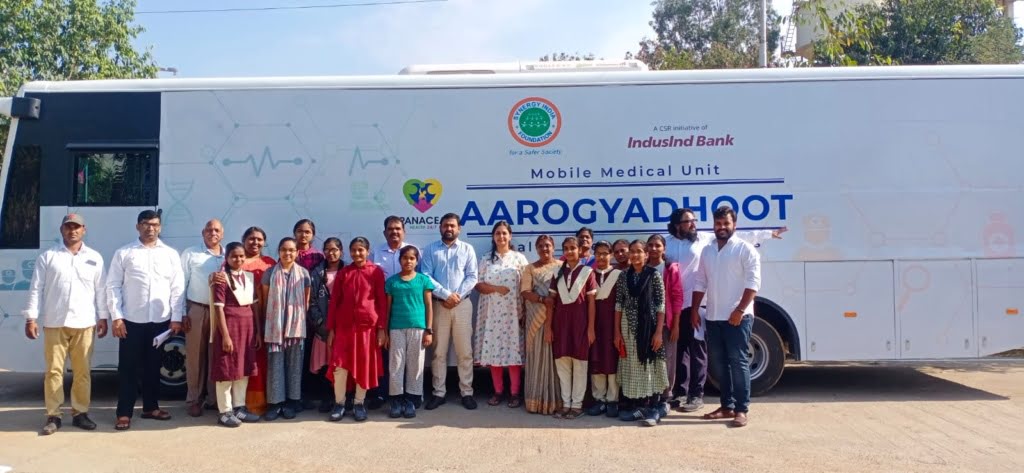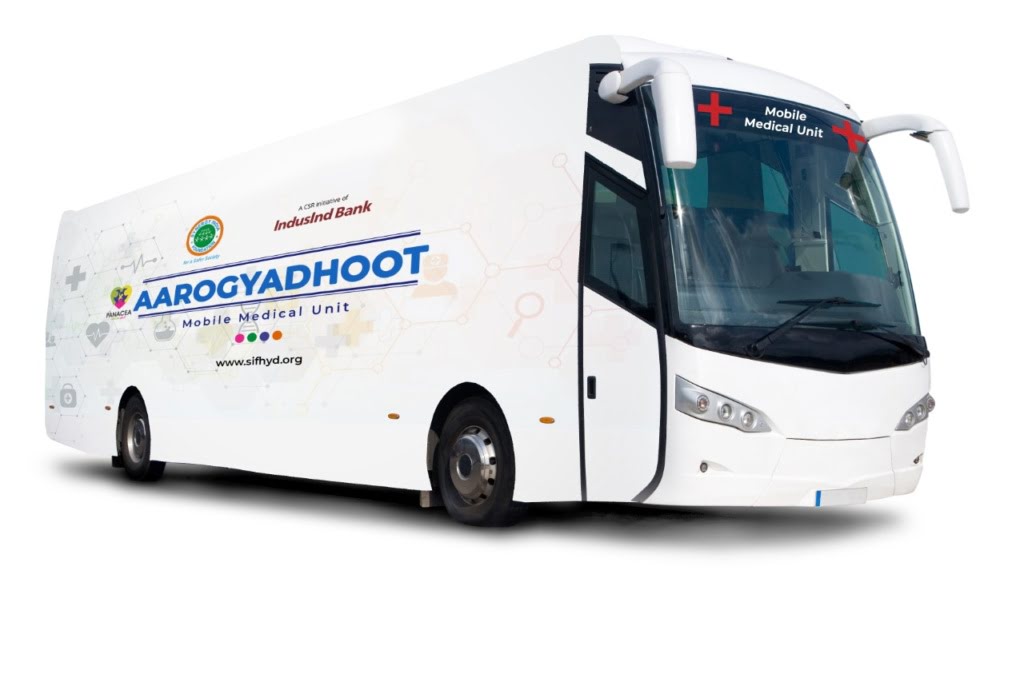REACHING THE UNREACHED
Under Aarogyadhoot Mobile Medical Healthcare Service, we revolutionize and expand healthcare accessibility, particularly in underserved and remote communities. Even though covering the far-flung areas has become accessible to some extent, reaching last mile populations remains a persistent challenge. Lack of services through fixed service delivery facilities is an area that we should address as a matter of priority. Mobile Medical Units (MMUs) are a key service strategy to reach such vulnerable populations.
We offer this innovative concept that involves a fully equipped medical facility on wheels, bringing healthcare services directly to the doorstep of those who may otherwise face barriers in accessing traditional healthcare settings. The mobile health clinic plays a pivotal role in addressing various healthcare challenges and has several key advantages.
Currently, SIF’s ‘Aarogyadhoot’ mobile health clinic is used for health screening of students studying in institutions of the Tribal Welfare and Social Welfare Department of Government of Telangana. Under this facility we provide:
- Latest machinery
- A mini testing lab
- A team of a general physician, a qualified nurse, a pharmacist and a driver.
The health screening facility includes Dental, Ophthalmological, Audiometry, and Hematological check-ups, alongside a dynamic real time software for record maintenance.
‘Aagroyadhoot’ is sponsored by IndusInd Bank, co-sponsored by TNR Trust for human resources, Avis Hospitals as government approved health care partner and Synergy India Foundation as the implementing partner.

Significance
As per a report published by NRHM, India – Healthcare is the right of every individual but lack of quality infrastructure, dearth of qualified medical functionaries, and non- access to basic medicines and medical facilities thwarts its reach to 60% of population in India. A majority of 700 million people lives in rural areas where the condition of medical facilities is deplorable.
It is when the role of Project Aarogyadhoot comes to play, offering multiple advantages:
- Increased Access to Healthcare: Mobile health clinics bridge the gap between healthcare providers and communities and serve as a lifeline for people living in rural areas, urban slums, or areas lacking adequate healthcare infrastructure.
- Timely Medical Care: By being mobile, these clinics can promptly respond to emerging health crises, epidemics, or natural disasters and rapidly deploy to offer medical assistance during emergencies and alleviate the burden on existing healthcare facilities.
Preventive Care and - Health Education: Offer screenings, vaccinations, and counselling on nutrition, hygiene, and disease prevention, thus contributing to healthier communities.
- Cost-Effectiveness: Mobile health clinics offer a cost-effective approach to healthcare delivery, particularly for areas with temporary medical needs.
Impact
Started during the current academic year, i.e., 2022-23, the program is in its pilot stage and has covered 37212 students from over 81 institutions across the state of Telangana, from inception till date i.e., November 2022.
Future Possibilities
Year 2022 is just the beginning in this direction for SIF. Aarogyadhoot is a proven model, and as a concept has great potential for health interventions at grassroots level. Presently SIF has only 1 Arogyadhoot van; but there’s a dire need to increase the number of vehicles for better outreach and coverage. Mobile Medical Units come across as a key intervention to facilitate access to public health care particularly to people living in remote, difficult, under-served and unreached areas by taking healthcare to the doorstep of populations, particularly rural, vulnerable and under-served areas.
Further, the following additions can be made into the ‘Arogyadhoot’ program for greater impact:
- Increase in number of Arogyadhoot vans.
- Regular review and documentation (written, audio-video documentation) of the activities of the van, through a structured framework and review tools and methods.
PROJECT : PANACEA SCHOOL HEALTH MONITORING THROUGH MOBILE MEDICAL UNIT
The project titled “Panacea – School Health Monitoring” has already screened 37212 girls studying in 81 SC/ST/BC welfare schools, supplied 120 sanitary napkins per child and installed 2 incinerators per school. Though the impact is at the individual level, the level of change will be compounding when scaled across the state and the nation. Synergy India Foundation who is the Project Coordinator and implementation partner, IndusInd Bank who sponsored the project, and TNR Trust as Human Resource Partner, Avis Hospitals as govt approved Healthcare partner.

To Provide Affordable, Accessible, and Quality Health Services to All
Mission has a mandate to reach everyone, particularly the perspective of service seekers. An ambient and bright environment where the patients are vulnerable and marginalised in the rural areas.
Mobile Medical Units(MMU) is an innovation which can be scaled with a researched framework and operational guidelines for MMU implementation design to provide optimal service through effective use of resources.
The proposed program will have a holistic approach to personal hygiene and institutional sanitation along with comprehensive health screening, and behavioural change and contribute to improved health.
PROJECT ACTIVITIES
Focusing on girl school students belonging to marginalised communities and poor socio-economic backgrounds (SC / ST / BC) and lack of awareness of personal health and basic hygiene practices. Health is one of the major concerns the following are planned for them :
- Menstrual Management: Supply of Sanitary Napkins
- Bio-Waste Management: Installation of Incinerators at School
- Health Screening: The screening would include Dental, Ophthal, Audio, Haematology
- Distribution of Nutrition Supplements: Iron Folic Tablets, Nutrition Bars
SERVICES INSIDE AAROGYADHOOT
Dentology
Conduct a brief visual assessment of the child’s mouth following up to date infection control guidelines and identify problems.
- Oral examination of children is carried out in the school setting.
- Identify oral health concerns at an early stage and prompt parents to seek treatment.
Ophthamology
Conduct Vision Screening, Identify and refer students with vision problems using selected vision screening procedures.
- creening of all school children.
- Provision and use of spectacles by children with refractive errors.
- Referral to Higher centers for interventions.
Audiology
Conduct hearing screening, identity and students with hearing problems using audiometer at school
- Screening children with hearing loss who were not identified at birth, or who developed hearing loss later.
- Referral to Higher centers for interventions.
Hametology
Conduct blood grouping and test for anaemia to identify students with iron deficiency.
- Get blood sample and identify the blood group for all students.
- Diagnose for anaemic students and prescribe iron and nutrition supplements.


